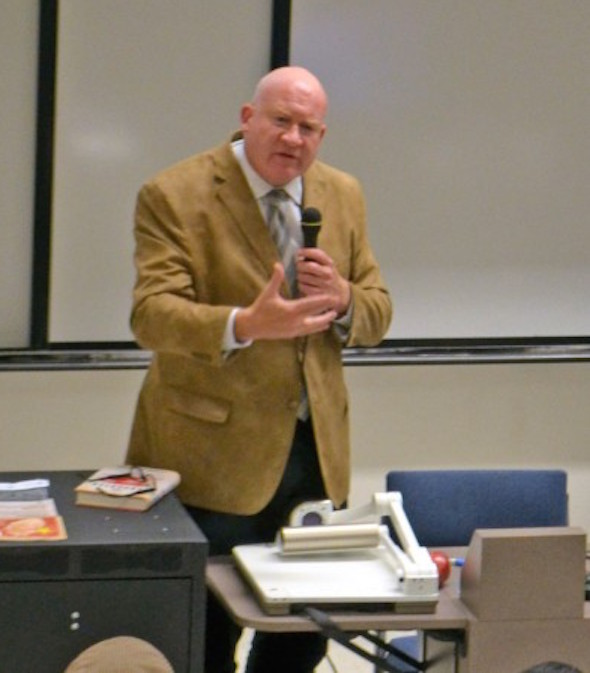Forced Organ Harvesting in China Discussed in Edmonton
Epoch Times
By Omid Ghoreishi, Epoch Times | October 31, 2014

Growing up, Alberta was a legendary place for Ethan Gutmann. The American author and journalist, who now calls London, U.K., home, finally made it to the prairie province, but it was to talk about a very difficult topic.
Gutmann, an award-winning China analyst and contributor to prominent publications, spent the past seven years researching state-sanctioned forced organ harvesting in China from prisoners of conscience, who are still alive when the organ is removed so it remains fresh and die only after the procedure.
On Oct. 28, Gutmann was in Edmonton to take part in a forum along with other speakers and talk about his new book on the subject, “The Slaughter: Mass Killings, Organ Harvesting, and China’s Secret Solution to Its Dissident Problem.”
“This really has a lot to do with Canada,” said Gutmann, who went on an eight-city Canadian tour to talk about his findings.
When reports of organ harvesting from live Falun Gong prisoners of conscience first surfaced in 2006, it was David Kilgour, a former Edmonton MP and Secretary of State for Asia Pacific, and David Matas, a Winnipeg-based international human rights lawyer, who first did a comprehensive investigation into the issue, publishing their findings in the book “Bloody Harvest: The Killing Of Falun Gong For Their Organs.”
“This is kind of homecoming, this is where the investigation started,” said Gutmann.
In his research for the book, Gutmann interviewed over 100 people, including victims of persecution and remorseful doctors in China’s military hospitals involved in forced organ harvesting.
“He’s an excellent researcher and writer. He doesn’t pull his punches like so many people do because they’re worried about their next visa to go to China,” said Kilgour, another keynote speaker at the event held at the University of Alberta’s Medical Sciences building.
Addressing the topic “How should Canada respond,” Kilgour referenced recommendations included in “Bloody Harvest” such as refusing to train Chinese transplant professionals at Canadian universities.
He also urged Edmontonians to talk with their representatives about introducing legislation making it illegal for Canadians to undergo organ transplantation in China, a practice known as organ tourism.
Edmontonians should also approach their MLAs and other representatives about removing the Beijing-run Confucius Institute from the Edmonton public school system, Kilgour suggested.
“Mao and the Communist Party detest Confucius and Confucianism … but [the Chinese Communist Party] discovered a lot of westerners don’t know this, and we all have a good opinion of Confucius and so they put this label on what is in fact propaganda,” he said.
Branded as promoting Chinese language and culture, Confucius Institutes have been cited by Chinese officials as tools used by the Chinese Communist Party to extend its soft power, and intelligence experts have said they are active in espionage. The Toronto District School Board voted to end its partnership with the institutes on Oct. 29, and McMaster University and the University of Sherbrooke also decided to end their partnerships recently.
‘Beyond Comprehension’
Dr. Charl Els, another keynote speaker at the event and a psychiatrist specialist who has worked with transplant patients for a number of years, said it’s an embarrassment that the medical community doesn’t know enough about forced organ harvesting in China.
Els is an associate clinical professor at the University of Alberta’s Department of Psychiatry and the John Dossetor Health Ethics Centre, the latter being one of the sponsors of the event.
“My initial response to [“The Slaughter”] was that I cannot begin to imagine the actual psychiatric turmoil and the hell people go through who are exposed to this, and families of people,” Els said.
“I cannot help but look at this on an existential level that this goes beyond comprehension. Certainly the issue of sanctity of life keeps coming back to me.”
To help end the practice in China, people can start by raising awareness and familiarizing themselves about the issue, Els said.
“Start talking about it, start getting angry about it, involve the emotions in getting to understand what is actually happening.”
Those involved with forced organ harvesting in China and any research they provide for publication should be banned from conferences and academic settings, he added.
“One of the other big things is the pharmaceutical industry—hold them to account. … Perhaps the pharmaceutical industry should act in a corporate-responsible fashion by taking their hands off [supplying products for use in this practice in China].”
